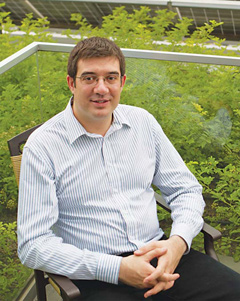China aims to draw more EU scientists
Updated: 2011-06-24 11:15
By Xiao Xiangyi (China Daily)
China's efforts to improve its achievements in science is propelling other nations to further enhance their scientific ties with the nation.
Though China and the European Union (EU) began scientific cooperation some time back, till now the balance was loaded heavily in favor of the EU with more and more Chinese scientists studying and undertaking research activities in the EU. Very few Europeans actually come to China for research activities.
|
|
"Europe understands the huge potential for scientific research and is keen on working closely with nations that are important in the area of science and technology. In this regard there has been an increase in the level of research in China, as it slowly improves in standard. The EU now feels more than ever that it should further bolster its connections with China," says Clemens Smolders, lead expert of the European Union's Science & Technology Fellowship Program in China (STF China).
The STF China program is an EU funded program that promotes ties in science and technology between China and EU. It also aims to give EU researchers knowledge about the Chinese language and research culture to develop long-lasting contacts with their Chinese counterparts
"Till now for every European coming to China, 12 Chinese have gone to Europe," Smolders says.
Smolders says that cultural and language barriers have often been stumbling blocks for Europeans in China. "Europeans hardly know what is really going on here," he says.
The STR China program started on Aug 18, 2008. The first group of 30 STF fellows from Europe came to Chinese institutions or universities in April 2009 for a two-year exchange program, followed by another batch in June 2010. During the first six months most of the visiting fellows underwent extensive language training so that they could converse with people on a daily basis.
"We feel that six months is long enough time for people to develop a strong base so that they can survive and learn more about China," Smolders says.
Armed with a PhD under her belt young Italian lawyer Antonella Forganni came to China last summer with absolutely no knowledge of the nation or its people, but of full curiosity and zeal.
Forganni came to the Department of Law at the Beijing Normal University to further develop her research. Together with 27 young researchers from Europe, she was in China as part of the STF China program.
Most of the visiting fellows, who are experts in specific areas, are invited by research centers, universities or academic institutions across various cities in China to further their research.
"This is my first time to China. Though in Italy we have knowledge of what is going on in China, living here gives me another kind of understanding. It's really a very special experience," says Forganni.
Even as research fellows gain valuable insights to advance their research, the hosting Chinese universities also reap rewards. Many of the visiting fellows conduct lectures and also act as supervisors for post-graduate students in their host institutions. They also publish their research results in China.
"Forganni, like former STF fellow Paolo Farah who also visited our college, is quite active in seminars. Compared to our students, these European researchers are especially better at case studies. Their overseas background helps diversify our study environment and their special way of thinking helps broaden our thoughts too," says Liao Shiping, Forganni's Chinese supervisor at Beijing Normal University.
Though the STF China program foresees no immediate benefits, it is seen as a long-term cooperation between the EU and China, aimed at cultivating a group of talents who know China well, and have worked with Chinese researchers.
"It's important for people to have international experience and exposure. Having been to China is considered a plus on your resume," Smolders says.
Though most of the visiting fellows will return to Europe after their two-year tenure, many are keen to stay on and make further strides in their fields of specialization.
"I would like to stay longer in China if I have a good opportunity, so first I'm going to try to find a position here in China," says Igor Cersosimo, an Italian researcher at Tsinghua University, studying climate change and sustainability of Beijing's urban development.
"It doesn't matter where you go to study, as having an international outlook will help your career as it makes you a more interesting person to work with," Smolders says.
"The first batch of STF fellows are now in the process of submitting their reports. In general, they have been very positive about being in China. Living in a different culture has made them more open-minded," he says.
Smolders feels that the EU will take steps to further expand the scope of its STF program with China and also make the relevant modifications in future.
At the same time China will also work actively to create more opportunities to attract scientific talents from overseas, including Europe. The Chinese Academy of Sciences (CAS) has already launched two programs - a visiting professorship for International Scientists and the Fellowship for Young International Scientists - that aim to attract foreign talent.
"Foreign scientists are convinced about our research standards and believe in the great potential that we offer in some fields, especially the excellent research facilities," says Lu Yonglong, director of the Bureau of International Cooperation at the CAS.
E-paper

Pret-a-design
China is taking bigger strides to become a force in fashion.
Preview of the coming issue
Franchise heating up
Party place
Specials

Premier Wen's European Visit
Premier Wen visits Hungary, Britain and Germany June 24-28.

My China story
Foreign readers are invited to share your China stories.

Mom’s the word
Italian expat struggles with learning English and experiences the joys of motherhood again.

